|
|
|
Sort Order |
|
|
|
Items / Page
|
|
|
|
|
|
|
| Srl | Item |
| 1 |
ID:
143319
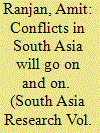

|
|
|
|
|
| Summary/Abstract |
This brief article, an extended review of two recent important publications, problematises the continuity of inter-state and intra-state conflicts since the partition of British India in 1947. Territory and identity are the main triggers of those conflicts, many of which will remain, while others will take on new forms relating to resource scarcity, mainly water. Conflicts are unlikely to be settled fully through various interventions, as sub-dimensions will linger on, develop new roots and new issues will constantly crop up. The article argues that past, present and future are visibly and invisibly connected through the fallout of patterns of myth and memory, dissatisfaction with the status quo and present conditions and often completely unrealistic expectations of a better future. Identifying elements of interconnectedness as central, the review assesses the contributions these two new studies make for a deeper understanding of the scenario of continuing conflict within the context of South Asian Studies.
|
|
|
|
|
|
|
|
|
|
|
|
|
|
|
|
| 2 |
ID:
143315
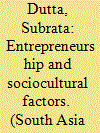

|
|
|
|
|
| Summary/Abstract |
Sociocultural factors in relation to the concept of entrepreneurship have been neglected in theories of economic development. While the growth of entrepreneurship often involves social and cultural issues, mainstream economists seem averse to discuss this. The present article emphasises the need for interdisciplinary enquiry to better understand various kinds of South Asian entrepreneurial activity and success from ethnographic and psycho-sociocultural perspectives. Existing research confirms that several non-economic factors can be identified as highly relevant for entrepreneurship and economic success. The article analyses those findings, places them in a wider context and calls for further research.
|
|
|
|
|
|
|
|
|
|
|
|
|
|
|
|
| 3 |
ID:
143317
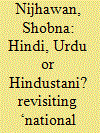

|
|
|
|
|
| Summary/Abstract |
Asking how the nationalist intelligentsia and Hindi literati sought to interact with and shape the new medium of radio in a period of time that witnessed the establishment of All India Radio’s Lucknow station in 1938, this article embeds colonial discussions of radio broadcasting into the cultural, literary and linguistic debates over Hindi, Urdu and Hindustani. The vibrant debate on the standardisation of Hindi, set against the background of All India Radio policies, is discussed from the perspective of those literary actors and institutions that envisioned diverse oral forms of Hindi and Hindustani for the rural and urban population residing in the Hindi belt and the rest of India. In addition, the article compares the radio broadcasting language to other contributions published in Hindi to show how languages operated not only in parallel but also in intersecting literary spheres. The article shows that language debates over radio broadcasting functioned as a site to probe the flexibility of what was to be officially projected as the language of the nation-to-be.
|
|
|
|
|
|
|
|
|
|
|
|
|
|
|
|
| 4 |
ID:
143314
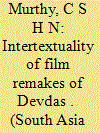

|
|
|
|
|
| Summary/Abstract |
The screen adaptation of the novella Devdas by Saratchandra Chattopadhyay is an important landmark in early Indian cinema. A prominent film, screened in four Indian languages (Bengali, Hindi, Telugu and Tamil), it seems to offer a novel vision of romantic love and romanticism. This article critiques the fanciful interpretations of the film provided by some postmodern academics in the field of comparative literature. It endeavours to place the film both as text and cinematic work into a broader perspective based on the study of intertextuality of three renditions: Raghavaiah’s Devdas (Telugu, 1953), Bimal Roy’s Devdas (Hindi, 1955) and Bhansali’s Devdas (Hindi, 2002). Grounded in cultural theory and Indian performative aesthetics coupled with moving image analysis, this study highlights the underlying, deep-rooted romanticism embedded in Indian philosophical and aesthetic traditions of devotion between atma (individual soul) and paramatma (absolute soul), personifying Paro/Chandramukhi as atma and Devdas as paramatma. This article, part of a larger project on de-Westernising media studies, makes a critical intervention in current South Asian Studies by aiming to provide a novel theoretical framework to which the philosophical and traditional tenets grounding the novella of Devdas can be anchored.
|
|
|
|
|
|
|
|
|
|
|
|
|
|
|
|
| 5 |
ID:
143316
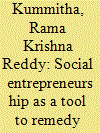

|
|
|
|
|
| Summary/Abstract |
Inspired by the practice of social enterprises, this article aims to understand how work integration social enterprises (WISE) function in relation to labour market integration of socially excluded persons in India. While mainly examining how socially excluded persons benefit from such interventions, questions are asked about what motivates social enterprises to get involved and to what extent they benefit themselves. Built on case study research in India, this article identifies a potential win–win situation, as members of excluded communities are empowered through the work integration approach, but social enterprises also benefit by building trust and achieving a sustainable orientation.
|
|
|
|
|
|
|
|
|
|
|
|
|
|
|
|
| 6 |
ID:
143313
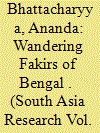

|
|
|
|
|
| Summary/Abstract |
The historiography of the Fakir rebellion has drawn much attention since Ghosh in 1930 depicted the Fakirs as raiders from outside Bengal. In independent India, two groups of ideology-driven historians, Marxists and Secularists, expounded the uprising as an early peasant rebellion and a shining example of Hindu–Muslim campaign against the Raj. This article explodes both scholarly myths, since its archival research reconfirms that the Fakirs were increasingly aggressive plunderers in religious garb, tormenting the Bengal countryside. Mainly based on colonial records, later parts of this article illustrate how and why the British felt increasingly compelled to curtail Fakir movements and activities.
|
|
|
|
|
|
|
|
|
|
|
|
|
|
|
|
| 7 |
ID:
143318
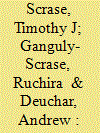

|
|
|
|
|
| Summary/Abstract |
Utilising qualitative research methods and drawing upon theories of social reproduction, this article examines how ethnicity intersects with students’ experiences of education in Darjeeling. The research explores how young men’s aspirations articulate their ethnic identity and their associated political demands. It shows how ethnicities are fostered within friendship groups on college campuses and also discusses young men’s criticisms of the Gorkhaland movement, offering a nuanced and textured account of ethnic struggles in this area. It is shown that young men draw upon education to develop ethnic identities that bridge caste divides and conceal class inequalities. The research sheds new light on how ethnicities are constructed amid the tensions of globalisation and regionalism, education and development.
|
|
|
|
|
|
|
|
|
|
|
|
|
|
|
|
|
|
|
|
|